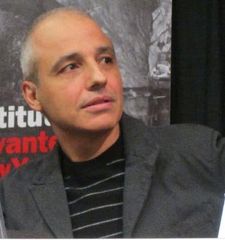 |
| Blancanieves director Pablo Berger Photo: Anne-katrin Titze |
Berger's magical construction opens with embroidery, a matador confronting a bull named Lucifer, and a locket with the picture of a beautiful woman inside. An incubator and a glass coffin relate to each other and just as in Bluebeard, houses have forbidden rooms on interdicted floors. Dwarves don't always have to work in mines, and statues of the Virgin make for good weapons in this black and white tale.
Anne-Katrin Titze: In a year with so many Snow Whites, yours stands out. I noticed how much film history of the 20th century finds its way into your tale. In the beginning, I had to think about People On Sunday, set in Berlin [The silent 1930 film , directed by Curt and Robert Siodmak, script by Billy Wilder, cinematography by Fred Zinnemann, produced by Edgar G. Ulmer, brought together these future Hollywood greats before they emigrated from Germany].
Pablo Berger: I love that movie. Not so many people know about that film. That's a beautiful film.
AKT: I saw a cinema path in your movie that starts with People On Sunday, stops by Rebecca (1940), moves on to Sunset Boulevard (1950) and ends at Tod Browning's Freaks (1932).
PB: I think that road you took is pretty right on. Definitely. I think before I'm a film director, I'm a film buff. I love cinema.
AKT: It shows.
PB: I even prefer watching movies to making them. As contemporary directors, we didn't go through WW II, we didn't go to safaris like John Huston or John Ford. Cinema was our window to the world. So all my films have a lot of homage to cinema. Of course, but that is only on the surface. I also put all my heart, all my personal experience in it. It's about fatherhood, it's about losing people you love. It's about passion.
AKT: There's not necessarily a contradiction between cinema and your own feelings, I would say.
PB: Completely. But definitely there are many homages to movies. All you have said and some more.
AKT: Can you give me some that I didn't get?
PB: I think you have to see it again. The movie has a little of Where's Wally [Waldo] for film buffs. What was important for me was to make a silent film but for a contemporary audience. I didn't want to make a replica, a copy. I wanted to create a film that has the flavor of vintage cinema but for an audience of today. So I didn't mind, for example, the homage to Rebecca and those big Hollywood melodramas of the Thirties and Forties, that was very important. I always wanted to have a movie with a big staircase.
AKT: And a big portrait.
PB: And a daughter who cannot get in.
AKT: Because a woman dressed in black [the marvelous Maribel Verdú as Encarna] doesn't let her.
PB: And a woman in black who is evil. Also for me the Gothic Novel was a big influence. Sometimes I got away from the fairy tales and into the Gothic Novel.
AKT: That is a very important distinction. You say in the titles at the start: "Inspired by the Brothers Grimm". Because you were taking a lot of liberties with their tales. You mix and match. Let's talk about the grandmother. First of all, I love the actress Ángela Molina.
PB: Everybody should have an Ángela in their life, she's wonderful and great to work with.
AKT: Her role as the grandmother is not in the classic fairy tale tradition. She is the one who pricks her finger, and dances to death. Can you talk about these shifts of meaning?
PB: It all has to do with that I have a nine year-old daughter. So this film has been an act of love. It's been eight years of my life. My first film was released in 2003 (Torremolinos 73) and my daughter was born in 2003. So my daughter has been growing with the person who was making this film. The original cinema is of story telling, of fairy tales for me. I would tell her stories every single day since she's three years old. Sometimes, I would tell her about Sleeping Beauty, sometimes about Alice. So I think, this film is definitely a combination of these tales. For example a tale that I love is Alice in Wonderland. Our Pépé [Snow White's pet rooster] is our rabbit from Wonderland.
AKT: How did you get the neckerchief on the rooster?
PB: That was one of the most difficult things of the whole film.
AKT: When I spoke with Michael Haneke about the pigeon scenes in Amour, he said what torture it was for poor Jean-Louis Trintignant to work with the birds. So the rooster was not cooperative?
PB: It's a great character. It's just one of those images. I thought, she has to have a pet rooster. But it meant hell. For the person in charge, the animal wrangler, for four months the roosters were living with him and every morning at five o'clock they woke everyone. So he was waiting for the film to be finished. We used many roosters and sometimes they behave like stars.
 |
| Pablo Berger Photo: Anne-katrin Titze |
PB: And initially, you know what I had? It wasn't even a scarf. That was a compromise. My original idea was a little Córdoba hat.
AKT: And you gave up on that?
PB: Yeah, I gave up. Then the animal wrangler suggested the scarf.
AKT: Talk a bit about the ending. I did not expect it at all to go in the direction of Freaks. It's very strong. Was it clear for you what you wanted to do about the classic happily ever after? Add a bit of Carl Theodor Dreyer's Day Of Wrath (1943)?
PB: Good catch. I don't get that kind of interview every day. Definitely I wanted to have an open end. An ending that is open to interpretation. There's the tear, maybe the beginning of something. Somehow you see life. Some people see it more tragic, some are more optimistic. But I have it like this open ended.
AKT: I have a hard time with bullfights. I was very moved by the forgiveness for the bull.
PB: For me, cinema has to be surprise. I think that's one of the codes. When I write my scripts, when I go to an area where the audience knows what's going to happen, I will go in the other direction. So for me it's great that you were surprised, that you didn't know what was going to happen. That's one of my goals.
AKT: A surprising character was the agent Don Carlos (José Maria Pou), he looks like Ralph Bellamy in Polanski's Rosemary's Baby, the friendly Dr. Saperstein who has this menacing quality.
PB: I cast him, because he has the power. He is like Mr. Arkadin, [Orson Welles, 1955, a.k.a. Confidential Report]. He did a major play in Spain, playing Welles. He is an actor that has charisma. He is really iconic.
AKT: In your version of the tale, you forgive the father. He cannot help not helping his daughter more - which is in the tradition of Disney, rather than the Grimms. The father is the gift giving one, the evil character is the female.
PB: In our version there are more characters, the Grimm tale is three pages. In their version the father disappears right away. For me, I wanted to talk about fatherhood, my daughter is the same age as Blancanieves, the small one. That was something I wanted to portray. An homage to cinema, but you also put in your personal life. I'm married, I have a daughter, I lost my parents, I can talk about that kind of thing. For me it was important to make a very positive love story between a father and his child.
Blancanieves kicked off the Film Society of Lincoln Center's 21st edition of Spanish Cinema Now (December 7-16).
This year's lineup also includes a retrospective for surrealist master filmmaker Luis Buñuel with additional screenings and lectures held at Instituto Cervantes. Other highlights include the alluring Chrysalis (De Tu Ventana A La Mía) directed by Paula Ortíz and Alvaro Longoria’s Sons Of The Clouds, produced and narrated by Javier Bardem.





















